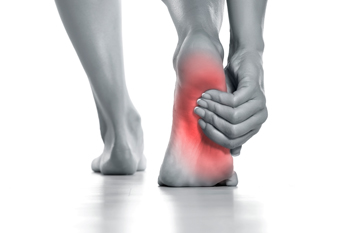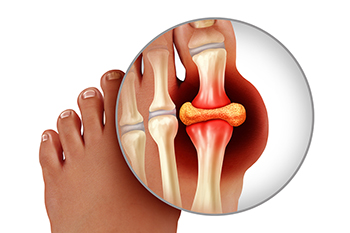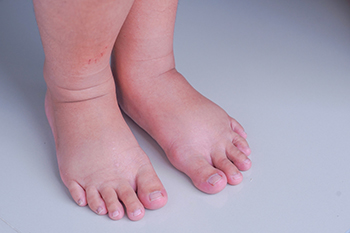Connect With Us
Blog
Items filtered by date: January 2024
Gout Pain Can Be Managed
Diagnosis and Treatment of Achilles Tendon Injuries

The Achilles tendon, the body's largest and strongest tendon, is susceptible to injury due to its limited blood supply and exposure to various forces. Aging and increased activity, particularly in high-velocity sports, raise the risk of Achilles tendon injuries. As the aging population remains active, these conditions are becoming more common, yet they are missed in approximately one-fourth of cases. Injuries can happen suddenly or develop gradually, often leading to extended healing processes. To make an accurate diagnosis and establish an effective treatment plan, a comprehensive medical history and specific physical examination are critical. The primary approach to managing tendonitis, peritendonitis, tendinosis, and retrocalcaneobursitis involves rest, cold therapy, anti-inflammatory medications, and orthotics. Tendon ruptures require casting or surgical intervention. Adequate treatment typically results in a complete recovery. If you have a painful Achilles tendon, it is suggested that you schedule an appointment with a podiatrist for a proper evaluation and treatment options.
Achilles tendon injuries need immediate attention to avoid future complications. If you have any concerns, contact Warren Levy, DPM of Armitage Podiatry Center. Our doctor can provide the care you need to keep you pain-free and on your feet.
What Is the Achilles Tendon?
The Achilles tendon is a tendon that connects the lower leg muscles and calf to the heel of the foot. It is the strongest tendon in the human body and is essential for making movement possible. Because this tendon is such an integral part of the body, any injuries to it can create immense difficulties and should immediately be presented to a doctor.
What Are the Symptoms of an Achilles Tendon Injury?
There are various types of injuries that can affect the Achilles tendon. The two most common injuries are Achilles tendinitis and ruptures of the tendon.
Achilles Tendinitis Symptoms
- Inflammation
- Dull to severe pain
- Increased blood flow to the tendon
- Thickening of the tendon
Rupture Symptoms
- Extreme pain and swelling in the foot
- Total immobility
Treatment and Prevention
Achilles tendon injuries are diagnosed by a thorough physical evaluation, which can include an MRI. Treatment involves rest, physical therapy, and in some cases, surgery. However, various preventative measures can be taken to avoid these injuries, such as:
- Thorough stretching of the tendon before and after exercise
- Strengthening exercises like calf raises, squats, leg curls, leg extensions, leg raises, lunges, and leg presses
If you have any questions please feel free to contact our office located in Chicago, IL . We offer the newest diagnostic tools and technology to treat your foot and ankle needs.
Foot Pain Management

Foot pain is a common symptom associated with various foot conditions, and there are several options available for pain relief. When dealing with foot pain, it is advisable to explore conservative, non-pharmaceutical methods first. If your foot feels warm to the touch, indicating inflammation, using cold treatment can help reduce swelling. Conversely, if your feet are tired but not inflamed, a warm foot soak can provide relaxation. Foot massage is another effective practice that can improve circulation, reduce tension, and alleviate pain, and it can easily be done on your own or with the help of massage devices such as foot rollers. When it comes to pharmaceutical treatment, there are various options to consider. Included among them are oral analgesics, topical analgesics, non-steroidal anti-inflammatory drugs, or NSAIDs, COX-2 inhibitors, nerve-related medication, nerve blocks, and corticosteroids. If you have persistent foot pain, it is suggested that you consult with a podiatrist for a proper diagnosis and treatment that will be tailored to your specific case.
Foot Pain
Foot pain can be extremely painful and debilitating. If you have a foot pain, consult with Warren Levy, DPM from Armitage Podiatry Center. Our doctor will assess your condition and provide you with quality foot and ankle treatment.
Causes
Foot pain is a very broad condition that could be caused by one or more ailments. The most common include:
- Bunions
- Hammertoes
- Plantar Fasciitis
- Bone Spurs
- Corns
- Tarsal Tunnel Syndrome
- Ingrown Toenails
- Arthritis (such as Gout, Rheumatoid, and Osteoarthritis)
- Flat Feet
- Injury (from stress fractures, broken toe, foot, ankle, Achilles tendon ruptures, and sprains)
- And more
Diagnosis
To figure out the cause of foot pain, podiatrists utilize several different methods. This can range from simple visual inspections and sensation tests to X-rays and MRI scans. Prior medical history, family medical history, and any recent physical traumatic events will all be taken into consideration for a proper diagnosis.
Treatment
Treatment depends upon the cause of the foot pain. Whether it is resting, staying off the foot, or having surgery; podiatrists have a number of treatment options available for foot pain.
If you have any questions, please feel free to contact our office located in Chicago, IL . We offer the newest diagnostic and treatment technologies for all your foot care needs.
Gout and Its Causes

Gout, an inflammatory arthritis, is a condition characterized by sudden, intense pain, redness, and swelling in the joints, most commonly affecting the big toe. The root cause of gout lies in the accumulation of urate crystals in the affected joints, leading to excruciating bouts of pain. Urate crystals form when the body produces excessive uric acid or fails to eliminate it efficiently. High levels of uric acid can result from dietary factors, particularly the consumption of purine-rich foods, like red meat, seafood, and alcohol. A genetic predisposition and certain medical conditions, such as kidney dysfunction, contribute to the likelihood of developing gout. Obesity and dehydration also play roles in exacerbating the condition. Understanding the definition and causes of gout is critical for individuals, enabling them to make informed lifestyle choices and dietary adjustments to manage and prevent the recurrent pain associated with this arthritic condition. If you have developed gout, it is strongly suggested that you are under the care of a podiatrist who can help you manage this condition.
Gout is a painful condition that can be treated. If you are seeking treatment, contact Warren Levy, DPM from Armitage Podiatry Center. Our doctor will treat your foot and ankle needs.
What Is Gout?
Gout is a form of arthritis that is characterized by sudden, severe attacks of pain, redness, and tenderness in the joints. The condition usually affects the joint at the base of the big toe. A gout attack can occur at any random time, such as the middle of the night while you are asleep.
Symptoms
- Intense Joint Pain - Usually around the large joint of your big toe, and it most severe within the first four to twelve hours
- Lingering Discomfort - Joint discomfort may last from a few days to a few weeks
- Inflammation and Redness -Affected joints may become swollen, tender, warm and red
- Limited Range of Motion - May experience a decrease in joint mobility
Risk Factors
- Genetics - If family members have gout, you’re more likely to have it
- Medications - Diuretic medications can raise uric acid levels
- Gender/Age - Gout is more common in men until the age of 60. It is believed that estrogen protects women until that point
- Diet - Eating red meat and shellfish increases your risk
- Alcohol - Having more than two alcoholic drinks per day increases your risk
- Obesity - Obese people are at a higher risk for gout
Prior to visiting your podiatrist to receive treatment for gout, there are a few things you should do beforehand. If you have gout you should write down your symptoms--including when they started and how often you experience them, important medical information you may have, and any questions you may have. Writing down these three things will help your podiatrist in assessing your specific situation so that he or she may provide the best route of treatment for you.
If you have any questions, please feel free to contact our office located in Chicago, IL . We offer the newest diagnostic and treatment technologies for all your foot care needs.
Causes and Treatment of Ankle Sprains

An ankle sprain occurs when ligaments are damaged due to a sudden incident, often when the foot rolls or twists beyond its usual range. This can result in the overstretching or tearing of ligaments. An inversion sprain causes strain on the outer ligaments and an eversion sprain affects the inner ligaments. Treatment for the majority of uncomplicated ankle sprains involves rest, avoiding weight on the ankle for the first 48 hours, compression using an elastic bandage, and elevating the foot to reduce swelling. If the ankle swells severely right after the injury and bearing weight is impossible, it is suggested that you schedule an immediate appointment with a podiatrist. Other signs for urgent attention include a loud crack or pop during the incident or an ankle deformity unrelated to swelling. Complete rehabilitation of the ankle joint is essential to avoid developing chronic weakness that can lead to further sprains. Among measures that can help are performing a range of motion, balance, and strengthening exercises with guidance from a podiatrist on length of time and intensity. To ensure a tailored treatment plan for a sprained ankle, it is suggested that you make an appointment with a podiatrist.
Although ankle sprains are common, they aren’t always minor injuries. If you need your ankle injury looked at, contact Warren Levy, DPM from Armitage Podiatry Center. Our doctor can provide the care you need to keep you pain-free and on your feet.
How Does an Ankle Sprain Occur?
Ankle sprains are the result of a tear in the ligaments within the ankle. These injuries may happen when you make a rapid shifting movement while your foot is planted. A less common way to sprain your ankle is when your ankle rolls inward while your foot turns outward.
What Are the Symptoms?
- Pain at the sight of the tear
- Bruising/Swelling
- Ankle area is tender to touch
- In severe cases, may hear/feel something tear
- Skin discoloration
Preventing a Sprain
- Wearing appropriate shoes for the occasion
- Stretching before exercises and sports
- Knowing your limits
Treatment of a Sprain
In many cases, the RICE method (Rest, Ice, Compression, and Elevate) is used to treat ankle sprains. However, you should see a podiatrist to see which treatment option would work best with your injury. In severe cases, surgery may be required.
It is important to ask your doctor about rehab options after you receive treatment for your injury. Stretching, strength training, and balance exercises may help the ankle heal while also preventing further injury.
If you have any questions, please feel free to contact our office located in Chicago, IL . We offer the newest diagnostic and treatment technologies for all your foot care needs.
Lymphoedema and Swelling of the Feet

Lymphoedema is a condition where the legs or feet swell due to fluid buildup because the body's lymphatic system, which functions similarly to veins, is struggling to remove it. This swelling is called edema and can happen when you do not move enough, such as after sitting for long periods during a flight. Persistent swelling of the feet, swelling that lasts over three months, is known as chronic edema, which suggests the beginning of lymphatic failure or early lymphoedema. If left untreated, chronic foot edema can cause skin changes, deeper tissue damage, and increase the risk of infections such as cellulitis. It is often associated with chronic venous insufficiency. Various factors can contribute to lymphoedema, including genetics, obesity, inactivity, vein problems, or damage from cancer treatments. Joint surgery may also impair lymphatic vessels, leading to lymphoedema. If you are experiencing swollen feet on a regular basis, it is suggested that you make an appointment with a podiatrist as quickly as possible to obtain treatment and prevent serious complications.
Swollen feet can be a sign of an underlying condition. If you have any concerns, contact Warren Levy, DPM of Armitage Podiatry Center. Our doctor can provide the care you need to keep you pain-free and on your feet.
Swollen feet are a common ailment among pregnant women and people who stand or sit for extended periods. Aging may increase the possibility of swollen feet and patients who are obese often notice when their feet are swelling too. There may be medical reasons why swollen feet occur:
- Phlebitis - A condition that causes the veins to become inflamed and can also cause leg pain.
- Liver disease - This may lead to low blood levels of albumin which is a protein. This can cause fluid in the blood to pass into the tissues and several areas of the body can become swollen.
- Heart failure - When the heart doesn’t pump properly the blood that is normally pumped back to the heart can pool in the veins of the legs causing swollen feet.
- Kidney disease - One of the main functions of the kidneys is releasing excess fluid in the body. This type of condition can make it difficult for the kidneys to function properly, and as a result the feet may become swollen.
- Deep-vein thrombosis (DVT)- This is a serious condition where blood clots form in the veins of the legs. They can block the return of blood from the legs to the heart which may cause the feet to swell. It is important to be treated by a podiatrist if this condition is present.
Swollen feet can also be caused by bone and tendon conditions, including fractures, arthritis, and tendinitis. Additionally, there may be skin and toenail conditions and an infection may cause the feet to swell. Patients who take medicine to treat high blood pressure may be prone to getting swollen feet.
Many patients elevate their feet to help relieve the swelling and this is generally a temporary remedy. When a podiatrist is consulted the reason behind the swelling can be uncovered and subsequently treated.
If you have any questions please feel free to contact our office located in Chicago, IL . We offer the newest diagnostic tools and technology to treat your foot and ankle needs.

